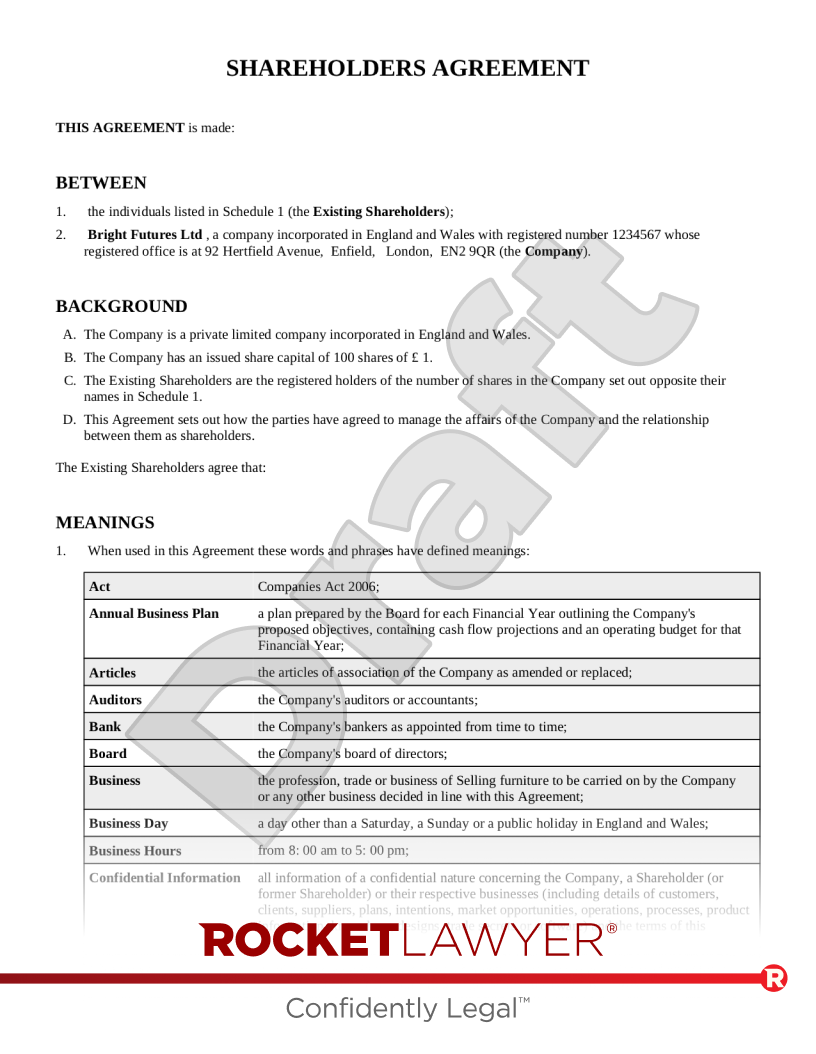What is a shareholders' agreement?
It’s an agreement made between some or all of the shareholders of a company that controls the relationship between one another. This is separate from the constitutional documents of the company.
The constitutional documents of the company, also known as the Articles of association, manage the separate relationship that exists between the shareholders and the company. Therefore, Shareholders’ agreements should be used in addition to the company’s constitutional documents.
Why have a shareholders’ agreement?
The terms of shareholders’ agreements are usually confidential while the company’s constitutional documents are open for public inspection at Companies House, meaning that any member of the public can examine them.
Shareholders’ agreements protect minority shareholders’ rights. Without an agreement, majority shareholders can make decisions that aren’t in the minority shareholders’ interests. To make changes to shareholders’ agreements, all the shareholders involved must agree, but to make changes to the company’s constitutional documents only a 75% majority must agree. This means that shareholders’ agreements provide minority shareholders with more protection.
Shareholders’ agreements also ensure that some key matters require all the shareholders to agree (eg changing the business of the company).
Shareholders' agreements provide a greater element of flexibility as they are usually easier than the company’s constitutional documents to manage, change or bring to an end.
What are the common provisions of a shareholders' agreement?
Shareholders’ agreements often include sections requiring all the shareholders to vote for or against particular key matters. These issues will often include:
- the business activities of the company
- mergers and acquisitions involving the company
- the employment terms of the directors
- lending or borrowing over certain sums and
- the dividend policy of the company
The shareholders' agreement will often contain a right of pre-emption (or first right to buy) for existing shareholders over the shares of a shareholder leaving the company. This means that leaving shareholders must first offer their shares to the remaining shareholders.
Shareholders’ agreements may include a process for resolving disputes. Examples include referring the issue to a third party expert or arbitrator, or what’s known as a buy-out method where one shareholder buys out the shares of another at a price that’s fixed in the agreement. If a dispute cannot be settled, shareholders’ agreements can contain 'deadlock provisions' which allow the parties to vote to wind up the company.
Shareholders' agreements often contain provisions providing for the automatic offer of the shares of one shareholder to the others in certain circumstances, including events of default, incapacity and death.
Clauses that protect the competitive interests of the company restrict shareholders from being involved in competitive activities. Examples include restrictive covenants which prevent the shareholders from being involved in competing businesses and/or from poaching key employees from the company.
How is a shareholders' agreement executed?
A shareholders’ agreement is a special type of contract called a ‘deed’.
Special rules about signatures (ie execution) apply to deeds. Additionally, a deed must make it clear on its face that it is a deed and the parties will sign it 'as a deed'.
For a shareholders’ agreement to be validly executed, it cannot be signed electronically. A copy of the document must be provided to each shareholder and company director. Each shareholder must sign each copy of the shareholders’ agreement in the presence of a witness. Each company director must also sign each copy of the shareholders’ agreement. Where only one company director is signing the shareholders’ agreements, a witness is required. The witnesses must then sign and add their names, addresses and occupations directly underneath the signature of the party they are witnessing.
The last party to sign the shareholders’ agreement should date the document in the space provided at the top to complete the shareholders’ agreement.
For more information, read Execution of deeds.
What is the difference between shareholders', founders’ and partnership agreements?
The Shareholders' agreement is an agreement between the shareholders in a private limited company (LTD). It details how they are governed, and what their relationship is to the company and to each other.
A Founders' agreement is an agreement between company founders that looks to establish the basics (eg founder roles and responsibilities and equity ownership), while a shareholders' agreement regulates the way that business between shareholders is conducted. In other words, a founders agreement is simply a form of shareholders’ agreement suitable at the early stages of the business and will typically be replaced by a more complicated shareholders’ agreement once the business takes on more shareholders. Read Founders’ agreements for more information.
A Partnership agreement sets out the terms when two or more partners engage in a business with a view to making a profit (ie the terms of a partnership). As a partnership has its own business structure with different rules and regulations it is not the same thing as a shareholders’ agreement. For further information, read Setting up a partnership.




